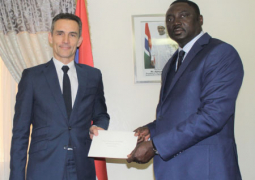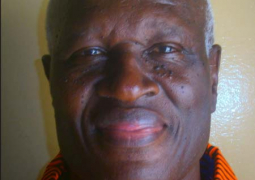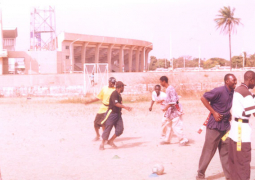Banjul,
The Gambia, December 11, 2019 Women from three rural areas of the Gambia
(Sintet, Janjanbureh, and Basse) will submit a report to the Truth,
Reconciliation and Reparations Commission (TRRC) on December 16 that describes
their experiences of sexual and gender-based violence (SGBV) during former
President Yahya Jammeh’s 22 years of dictatorial rule and the impact of the
violations on their lives and families. In the report, the women join voices to
offer recommendations to the TRRC and the Gambian government.
The
International Center for Transitional Justice (ICTJ) and women support groups
in the three regions collaborated to produce the report. Beginning last March,
ICTJ conducted a series of consultation workshops with women in each region to
collect and document their stories, with the purpose of helping them write and
submit a report to the TRRC. In total, ICTJ consulted 75 women, including women
victims and leaders, who recounted their experiences of human rights violations
and SBGV in their communities through storytelling and interviews.
During
the workshops, the women discussed their experiences of the dictatorship and how
they survived without any support, hiding the violations they suffered from
their families and finding strength in their own resilience. Fearing further
victimization or stigmatization, they call on the TRRC to establish alternative
channels to collect more experiences from women during the dictatorship. As one
woman explained, “We want the TRRC to consider our recommendations and develop
approaches that will enhance our participation in the TRRC process.” Moreover,
the women ask that these violations never happen again, and recommend that the
government enforce and strengthen laws protecting women’s rights. They also
recommend that the government provide community-based psychosocial support and
reparation to the women victims.
The
former regime was characterized by arbitrary arrests and detention, killings,
torture, exploitation, and all forms of violations against women. In addition
to already known and documented atrocities, ICTJ’s consultations revealed that
many of these women were forced to work on the Jammeh’s farms where some of
them were sexually abused or exploited. The women also experienced social and
economic hardships, which persist today, as a result of the pervasive
violations they suffered under the past regime that were never properly addressed.
In
submitting their report to the TRRC, the women hope to ensure that their
experiences are included in the country’s narrative of the past, and that the
government takes vigorous measures to improve protections for women today and
in next generation. As one of the women declared, “We should be given the
platform to tell our stories, for we do not want our children to suffer the
same violations we did.”
Contacts
Chris
Boland, Communications Associate, ICTJ
Tel.:
+1 917 637 3805
Email:
cboland@ictj.org
Didier
Gbery, Head of Program, the Gambia, ICTJ
Tel.:
+220 213 7318
Email:
dgbery@ictj.org
About
ICTJ
The
International Center for Transitional Justice (ICTJ) works across society and
borders to challenge the causes and address the consequences of massive human
rights violations. We affirm victims’ dignity, fight impunity, and promote
responsive institutions. ICTJ envisions a world where societies break the cycle
of massive human rights violations and lay the foundations for peace, justice,
and inclusion. For more information, visit www.ictj.org.




